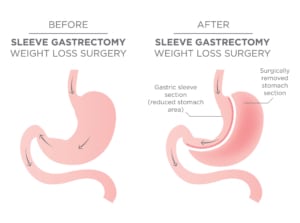Bariatric Surgery
 Bariatric surgery, also known as weight loss surgery, comprises a number of procedures to allow patients who suffer from obesity to achieve long-term weight loss and improvement/resolution of their comorbidities through alterations to the digestive system. These changes limit how much one can consume and/or reduces the absorption of nutrients.
Bariatric surgery, also known as weight loss surgery, comprises a number of procedures to allow patients who suffer from obesity to achieve long-term weight loss and improvement/resolution of their comorbidities through alterations to the digestive system. These changes limit how much one can consume and/or reduces the absorption of nutrients.
Bariatric surgical procedures are typically recommended when other weight loss measures have failed including diet, exercise, and other lifestyle changes, and when serious health concerns are present due to being overweight or obese.
Bariatric surgery has also been shown to improve or resolve other serious diseases linked to obesity such as:
- Type 2 diabetes
- Sleep apnea
- Heart disease
- High blood pressure
- Gastroesophageal reflux disease
- Osteoarthritis
The different types of bariatric procedures that our surgeons perform include:
- Robotic or Laparoscopic Gastric Bypass
- Robotic or Laparoscopic Gastric Sleeve
The team’s specialty training allows them to perform these operations with excellent outcomes and low risks of complications. They perform these operations minimally-invasively utilizing laparoscopic surgery or robotic surgery with only 4 to 6 small incisions (cuts) on the abdomen (belly). This allows patients a very fast recovery allowing patients to be discharged home in 1-2 days.
Most importantly, our team understands that weight-loss surgery is only one component of the equation required for successful outcomes. Obesity is a surgical disease; however, a multidisciplinary approach with pre/post surgical lifestyle changes including consultations with a nutritionist/dietician, physical therapist, and others are required to achieve the best outcomes.
Gastric Bypass
Gastric bypass surgery, coined Roux-en-Y surgery, is known as the gold standard of weight loss procedures and consists of two segments. In the first phase, a surgeon staples the stomach to decrease its size and create a small pouch. This allows patients to consume less food and drink while feeling full. Afterward, the surgeon attaches the lower end of the small intestine to the stomach pouch, allowing food to bypass most of a patient’s digestive system and limiting their calorie absorption.

The bypassed portion remains attached to the rest of the stomach, enabling digestive enzymes to flow from the stomach and the upper small intestine into the lower part of the small intestine. The bypass also affects gut hormones, bacteria, and other factors influencing appetite and metabolism. Although it presents a significant challenge, gastric bypass can be reversed by a surgeon if deemed medically necessary.
Gastric Sleeve
A more recent weight-loss procedure, gastric sleeve surgery, also known as sleeve gastrectomy, is where a surgeon removes roughly 80% of a patient’s stomach, leaving only a tube-shaped portion that is sealed with staples. The procedure reduces the size of the stomach, allowing patients to feel full faster.
Its most significant impact may be seen on gut hormones and bacteria that limit appetite, curb hunger, improve satiety, and enhance metabolism and blood sugar control. The surgery is permanent as the part of the stomach that was taken out cannot be restored.
Revisional Bariatric Surgery
Problems after bariatric surgery are, for the most part, rare. However, sometimes revisional surgery may be necessary for patients who have been unsuccessful at losing weight or suffer from complications. Revision surgery is challenging, and patients need to consult with their surgeons to come up with custom-tailored solutions to fit their unique situation, medical history, and lifestyle.
Procedures to alter or reverse bariatric surgery include:
- Gastric band surgery can be undone or modified to a sleeve gastrectomy or a Roux-en-Y gastric bypass.
- The Roux-en-Y gastric bypass can be revised or reversed for certain conditions.
- An unsuccessful sleeve gastrectomy can be revised to a gastric bypass.
Which type of weight-loss surgery is best for each individual depends on their unique situation including body mass index, eating habits, health issues, previous surgeries, and the risks of each procedure.
Our surgical team is happy to discuss your goals and desires in regards to weight loss and operations and tailor a specific plan for you.
Testimonials


Drag vertical bar, horizontally, to show before and after photos.


Sign Up for Our Newsletter to Get the Latest Updates
Sign Up for Our Newsletter to Get the Latest Updates
Oviedo/Winter Springs
(Inside Medical Office Building)
8400 Red Bug Lake Road
Suite 2090
Oviedo, FL 32765
Sanford Office
2100 West 1st Street
Sanford, FL 32771
Hospital Privileges at AdventHealth, HCA Lake Monroe Hospital, Orlando Health, Oviedo Medical Center, and UCF Lake Nona Hospital

